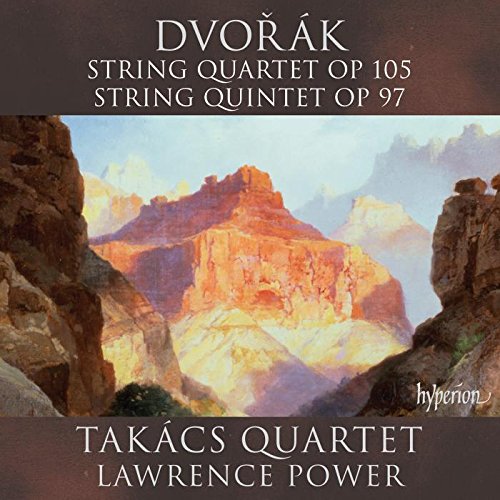DVOŘÁK String Quintet Op 97. String Quartet Op 105
View record and artist detailsRecord and Artist Details
Composer or Director: Antonín Dvořák
Genre:
Chamber
Label: Hyperion
Magazine Review Date: 10/2017
Media Format: CD or Download
Media Runtime: 64
Mastering:
DDD
Catalogue Number: CDA68142

Tracks:
| Composition | Artist Credit |
|---|---|
| String Quintet, 'American' |
Antonín Dvořák, Composer
Antonín Dvořák, Composer Lawrence Power, Viola Takács Quartet |
| String Quartet No. 14 |
Antonín Dvořák, Composer
Antonín Dvořák, Composer Takács Quartet |
Author: Harriet Smith
The ebb and flow of the Quintet’s first movement unfolds with complete naturalness and if at times there’s a sense that climaxes could be lusher-toned, the detailing and interplay are beyond reproach. The second movement is one of the highlights – the Raphael, while good, are not as silky-toned, and the way the Takács and Power use vibrato as an expressive device rather than a default position is one of the many pleasures of their playing. The kampa are more overly folky here, tending to make the accents sharper, but how beautifully the first viola on this new disc launches the minor-key melody of the Trio section. There’s an intensity to the slow movement that puts me in mind of the Takács’s recordings of late Beethoven, compared to which the kampa are more straightforwardly warm-hearted. The variations that follow are vibrantly coloured and intimately voiced, the shadows finally dispatched in the rumbustious finale.
The Op 105 Quartet, begun in America but finished in Prague, likewise impresses from the start, the minimal vibrato giving the opening a real sense of portent. Occasionally I hankered after more drive through the Allegro appassionato but in the Takács’s hands the delightful Molto vivace second movement has supreme lightness – the four players demonstrating that innate lightning-quick reflex that you find in the greatest quartets. Their Trio is also intoxicating, as is the way they move from this back into the opening furiant (from 3'59") – a masterclass of subtle inevitability. The Hagen are perhaps less subtle, tending to bite into accents more vigorously. The slow movement is given all the space it needs, even if it’s possible to imagine a still-warmer sound quality characteristic of home-grown Czech groups. The minor-key middle section, in which the melody is passed from first violin to fruity viola against throbbing cello backdrop, is, however, given with due intensity. As we return to the major-key main idea, they delight anew in its chirruping playfulness. The Takács relish, too, the skitteringly dramatic opening to the finale before it sets off its jolly discourse (though listen to the Smetana Quartet here for a more echt Czech sound). This is a movement that can, in the wrong hands, sound discursive – but not here, and the Takács’s way with the close brings a suitably uplifting ending to an entrancing disc.
Discover the world's largest classical music catalogue with Presto Music.

Gramophone Digital Club
- Digital Edition
- Digital Archive
- Reviews Database
- Full website access
From £8.75 / month
Subscribe
Gramophone Full Club
- Print Edition
- Digital Edition
- Digital Archive
- Reviews Database
- Full website access
From £11.00 / month
Subscribe
If you are a library, university or other organisation that would be interested in an institutional subscription to Gramophone please click here for further information.




